I left the Americans’ farm and began my last push to the border. I’d given myself two half days but that was all I felt I could afford. I hadn’t had a day off since Shangri-La but progress was slow in the mountains and time was ticking.
I feel like I’ve been under time pressure every month in China. In fact, ever since I left London I’ve been trying to make one deadline or another. The one from the start was to get past winter before it hit hard. That didn’t really work out. But all I need to do now is get over that border and catch my breath in Vietnam.

The road meandered through glowing rapeseed fields that formed a continuous yellow ocean between villages.
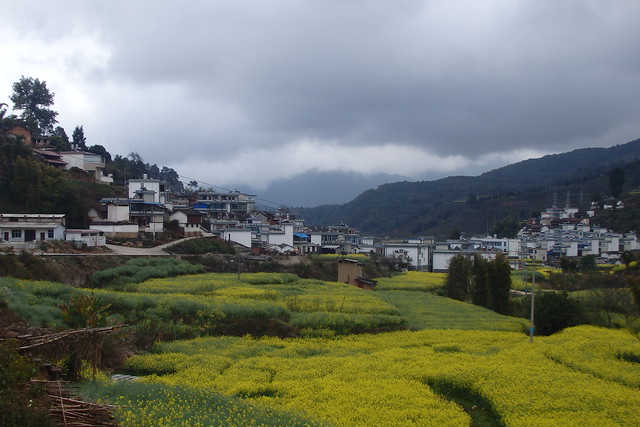
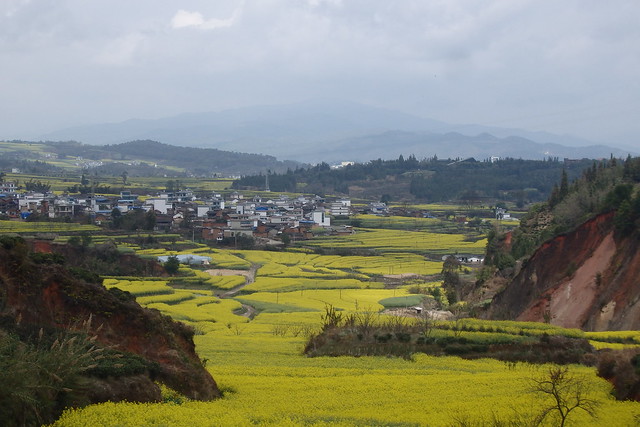

I crossed the Mekong river once again and looked for somewhere to camp. I found a small clearing by a small river and made myself comfortable. I was very popular that evening in my ‘secret’ spot. My first visitor was a fisherman who popped out of nowhere and looked as confused seeing me as I was he. He invited me back (I think) to his village but I’d already set up camp. I showed him my cooking gear and he offered me a fresh fish which I politely declined. I’ve had enough of bony fish in this country.
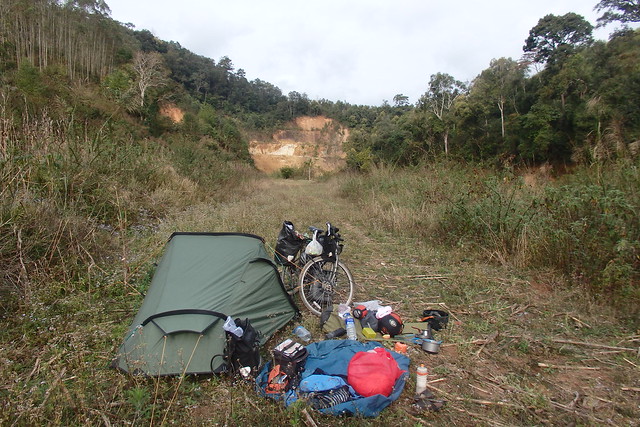
The Americans had given me a jar of peanut butter so I cooked up a veggie peanut curry washed down with the beer I’d picked up in the last village. I even had a brownie for dessert!
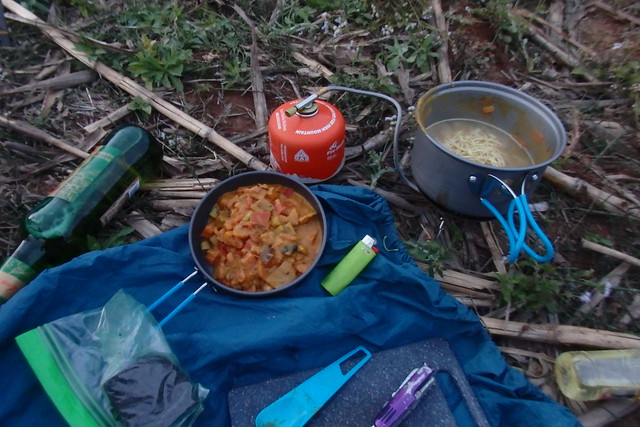
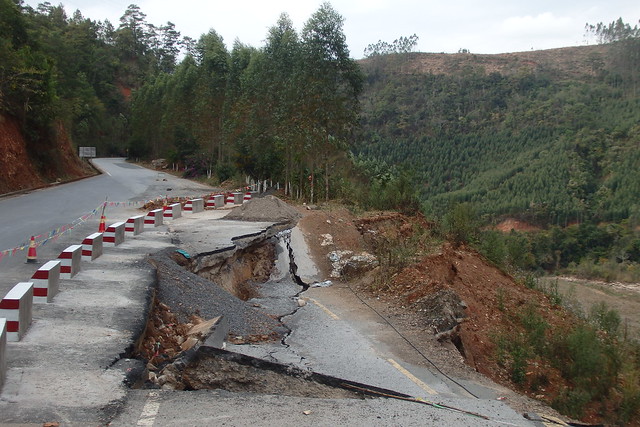
At about 9.30pm I was finishing up my book’s chapter before going to sleep when I heard noises outside my tent. A torch beam flashed across the canvas roof and the chatter came close. I don’t mind when people find my camp in the morning, it only bothers me slightly when someone spots me before dark (depending on who they are and how they’re acting) but people finding me in the night when it’s dark always puts me on edge.
I quickly put on my headtorch and climbed outside to see who it was. As I flicked it on I noticed there were 3 figures – one of whom was holding a gun. The reason I get ‘put on edge’ when people find my camp in the dark is because of that recurring dream that one day armed men are going to find me camped in the middle of nowhere and take the opportunity to rob me of everything. It’s what the nightmares are made of.
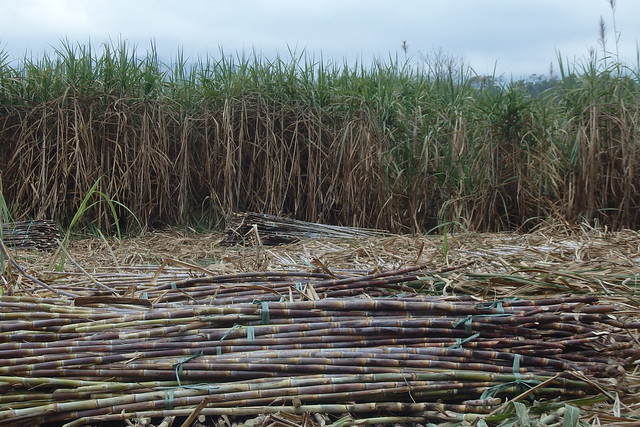
As my torch lit them up I noticed that one of the shadows was of a kid and I relaxed. They were hunters. We exchanged a smile and they wandered down to the river. I followed them through the reeds, now wide awake and eager to see what they were up to. The dad went wading across the river while I sat with the kid and grandad. Their mimes suggested they were looking for a bird to eat but what kind of bird can you spot in the dark? I thought perhaps they were looking for nocturnal mammal whose eyes’ reflection in the torch beam would give it away but they didn’t find anything so I’ll never know.
I went back to sleep but a few hours later was woken up again. My tent was flapping hard in the wind and brushing into my head. I drifted in and out of sleep trying to ignore it but the movements became more violent. I was camping between trees in a narrow valley, how could it be so windy?
I quickly realised that something was inside the tent and I jumped up. As I turned I saw what was causing the flapping tent – an animal the size of a clenched fist was jumping around trying to get out. I grabbed my sleeping bag managed to swat it out the door before I could work out what it was. The armed guys who found my tent hadn’t scared me half as much as this little thing. At first I thought it was a small jumping rodent but it must have just been a huge frog.
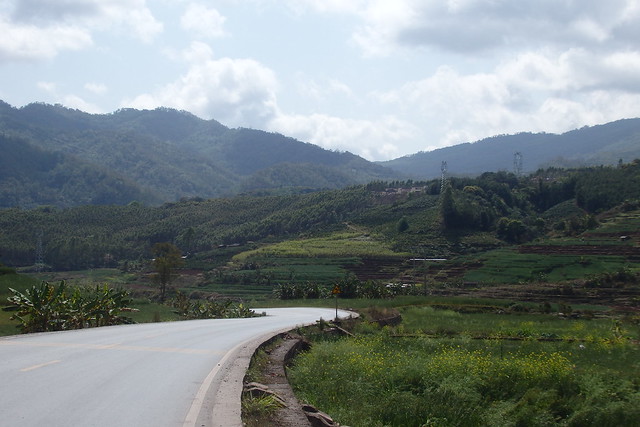
You might recall me complaining about my tent door being broken a couple of posts ago. Well, it’s very much still broken. I have to share my tent with snails, slugs, moths, ants, caterpillars and many other strange jungle critters I can’t identify. The mosquitoes are the biggest problem, especially as I enter Malaria zones without any medicine.
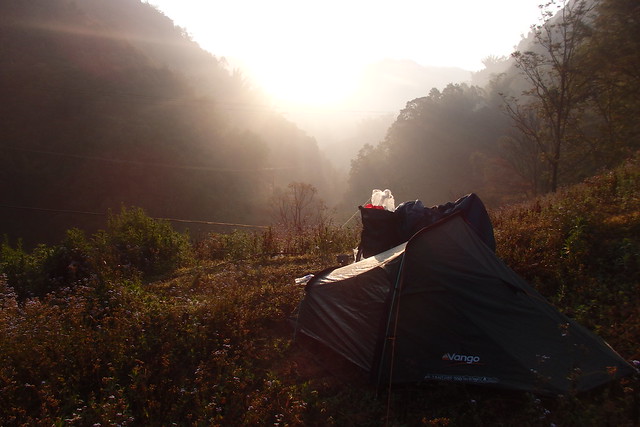
The world was changing around me quickly these days. Things continued to look more and more ‘South East Asian’ and each day became a little more humid. Nothing unbearable yet but spring lasted less than week somewhere around the 1,000-2,000m altitude. I was back down to below 500m – the lowest I’d been since the Gobi desert. The people were looking different and so was their fashion. The crops were different too: I was now cycling through banana, sugarcane and tea plantations. And the landscapes were different: the forest was more jungle than ever and the mountains were compact and tight around the rivers.
The towns were more charming here. They did feel as ‘planned’ as the purpose built urban areas and had a scatty charm to them. I’d nip in in search of market and cause chaos wheeling my loaded bicycle through narrow alleys lined by traders. The elderly women would sit by the side of the road in the colourful attire of their ethnic group, flogging the vegetables grown in the gardens while men carried cages of squawking chickens passed them. They were a lot of fun.
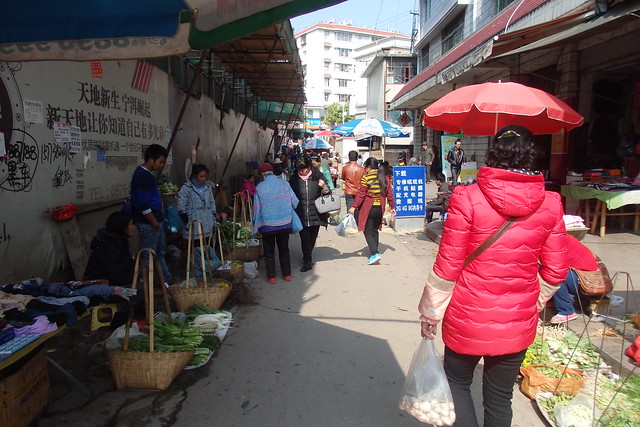
After Pu’er I could finally leave the main road again. I headed for the small village road that would carry me east. The next few days were a bumpy affair, riding a piece-of-crap road through little mountain settlements that felt detached from the rest of the country. The people suffered the usual attitude problem that plagues this country. Blank stares and stern faces. People almost looked scared of me despite my warm smile and greetings.
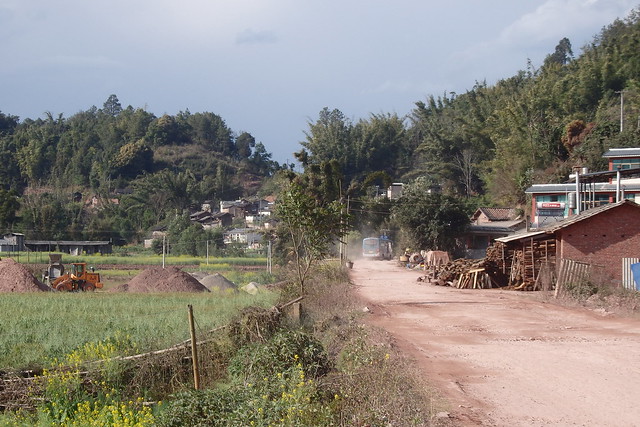

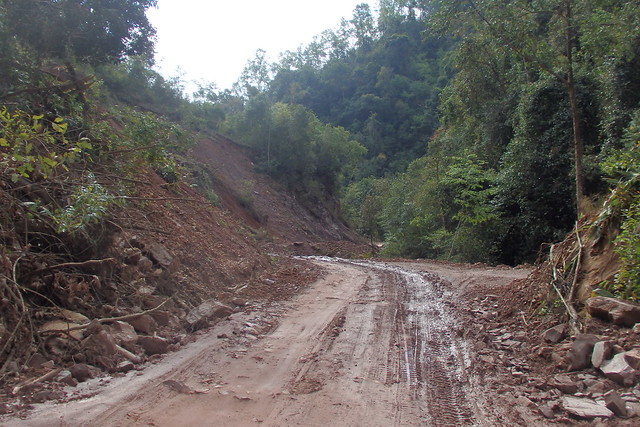
There were banana plantations for miles. Every tree had a blue plastic bag hanging over its fruit. I had to look under one to work out what they were for. The mountains were lined in a surreal combination of green palm leaves and bright blue plastic bags. In one village I passed a group cleaning banana bunches before loading the fruit into cardboard boxes marked ‘CHINA PRODUCT’ and onto a huge truck, ready for export to markets around the world. I stopped to buy some bananas of a roadside vendor. They cost about 3RMB (3p) each – and that wasn’t even close to the cheapest price I was getting bananas for over the last couple weeks in China!
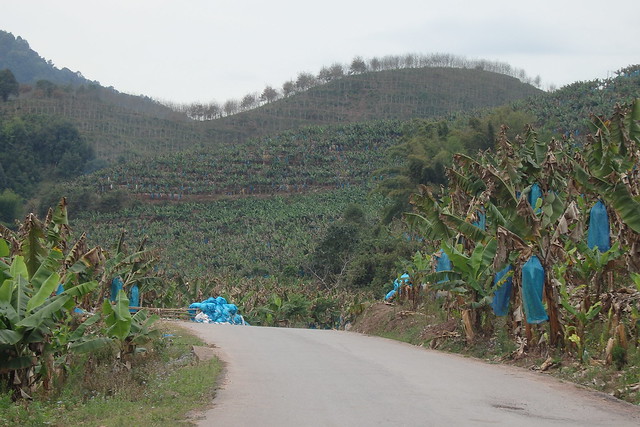
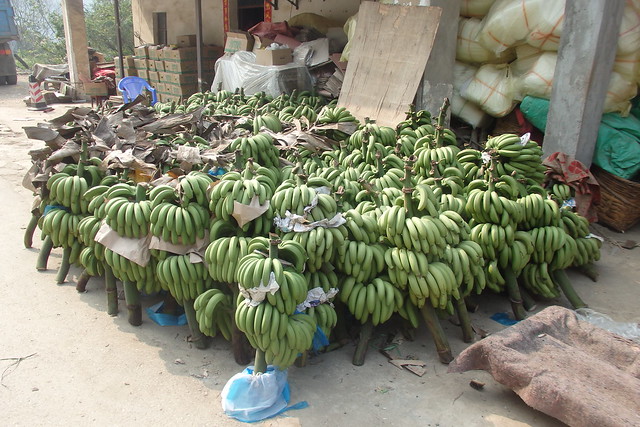
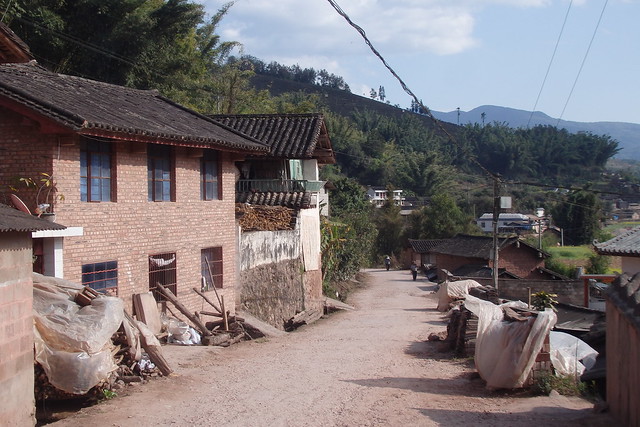
I stayed in a cheap hotel in Jianghong – a small town only about 20km as-the-crow-flies from the Laos border. Many of the shop and hotel signs were tri-lingual, in both Mandarin, Laotian and Vietnamese.
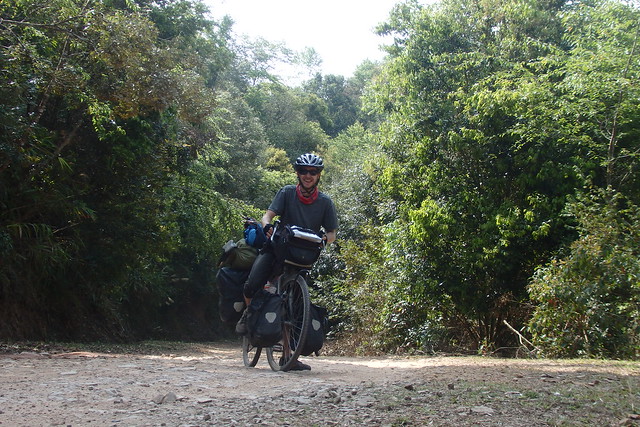
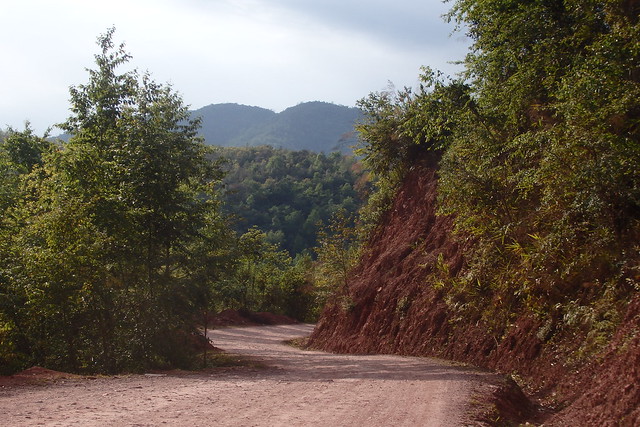
I passed a military checkpoint as I rode onwards. I only stopped when the army guys came running after me. All the guys in this part of the country insist on wearing camo gear as their day-to-day attire making it hard to tell who’s actually army or just a local farmer. I thought these guys were just regular blokes until they came shouting ‘passport, passport!’ after me.
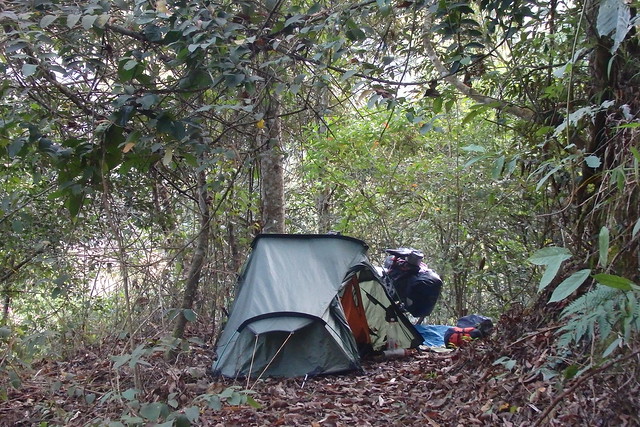
I crossed another mountain pass and suddenly the people changed again. They were Hani people – easily identifiable by their indigenous dress. The men were wearing camo gear like everywhere else but the women were had these strange black hats with long string dangling from them down their backs.
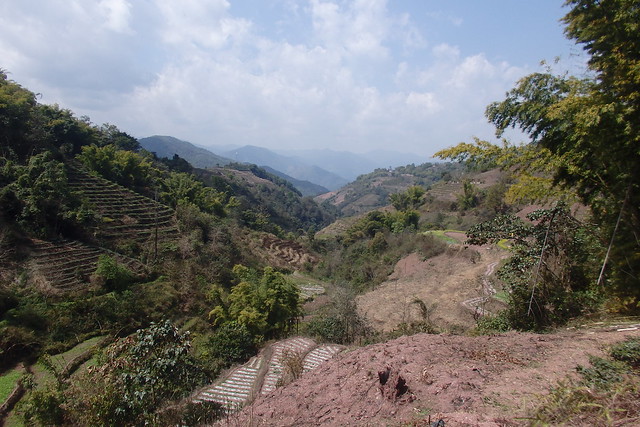
They were lovely. Everyone shouted hello, kids came out waving and even the grannies (the main demographic of blank starers in this country) gave me big grins as I rode past.
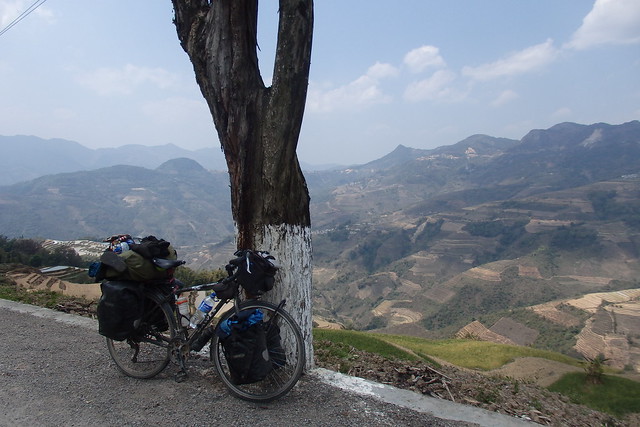
If I’ve learnt one thing on this tour it’s how powerful a smile can be. They take such little muscle effort to create but the results are contagious. I put my tent up in among some banana trees and sat up watching the fireflies flicker as the night absorbed my campsite. All it had taken was a few smiles and I was in the best of moods once again.

The next morning I cycled about 5km up towards the next mountain pass when I passed a big street party. I was flagged down and invited to join in the festivities. It was a wedding and I’d apparently arrived at peak time – 10am. Food was everywhere and the drinks were flowing. The woman were carrying around huge dishes of food in their beautiful Hani dresses while the men sat around smoking and getting as drunk as possible.
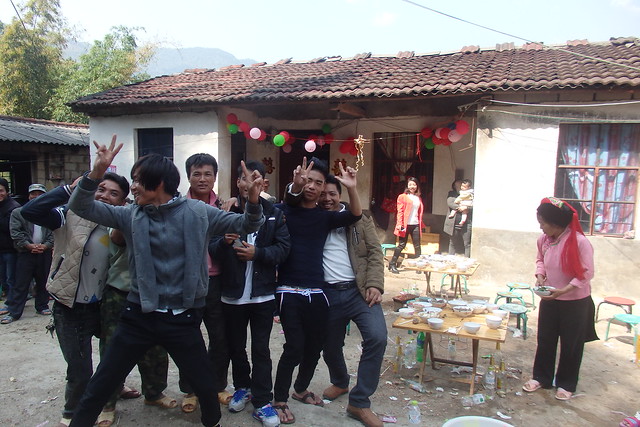
Everyone wanted a toast with the foreigner. I was drunk on baiju within half an hour, even my well-lined stomach couldn’t save me. I’d accepted the first cigarette I was offered to be polite, but then I wasn’t able to refuse the next 50 I was handed.
The Chinese’s cigarette culture is amusing: when someone opens a pack they’ll offer a cig to everyone (male) around. Even when I already had the first one in my mouth I was passed a new one. I politely shook my head but they insisted I took one. Then a couple minutes later I was still finishing the first one when another was offered to me. I shook my head again, pointing to the one between my lips and the other already queued up but the new guy insisted. So, by the time I’d finished the first fag there was another two lined up for me. It’s not just me playing this game – they all are. I apologised to my lungs over and over again during the next hour.
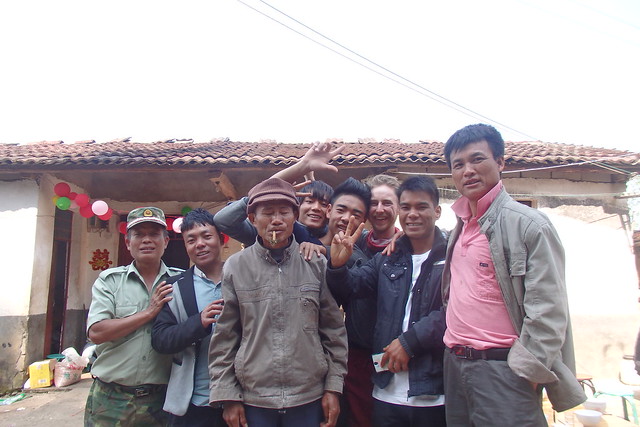
I was impressed they were so drunk so early. How on earth will they get through the rest of the day? The groom was battered. I hope Hani weddings don’t work the same way as Christian ones do – if he’s this drunk in the morning and they carry on all day then God knows how he’ll get it up tonight.
The bride was walking around in her pyjamas. People in China love wearing PJs. I’m not sure there’s anywhere else in the world where you could dress like that for your own wedding. At least the older women were ‘representing’ in their traditional dress.

One of the younger women could muster a couple of words in English and told me she was a teacher. I handed her the newspaper clipping that had been printed about me in Chengdu and she translated what I was up to. It’s amazing how many people can’t speak Mandarin in these places, let alone read it.
I left having made a whole bunch of new friends. England and China are the best of friends according to this lot. To get their point across they used Japan as an example of a country that they have the opposite relationship with, demonstrated by a bunch of crude gestures. They really really hate the Japanese in this country. It’s just been the 70th anniversary of the ‘Victory over Japan Day’ of WWII and the only thing that seems to be on TV in this country is anti-Japanese chat.
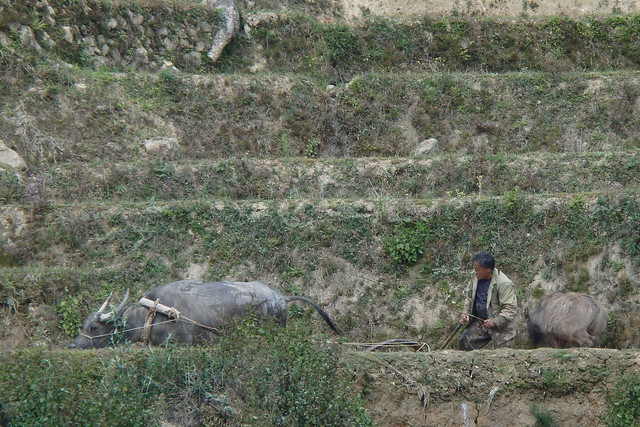
I still had 20km of uphill cycling to the pass. It was hard work. I was far too drunk and the days were starting to get hot. I’d wasted the morning hours getting wasted and once again regretted not being more sensible.
Over the other side of the mountain everyone was back to their miserable selves. No one wanted to say hello. It made no sense, but the change was obvious.
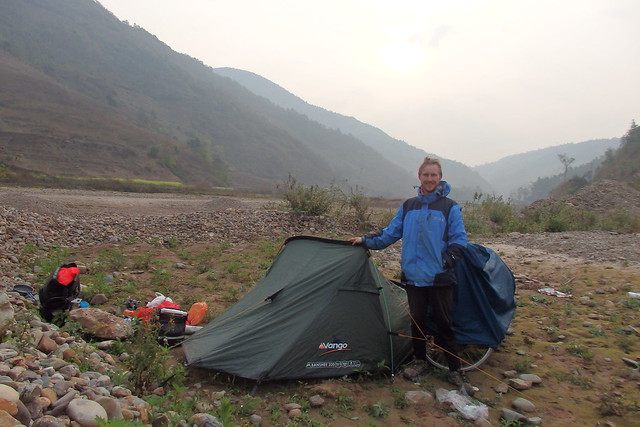
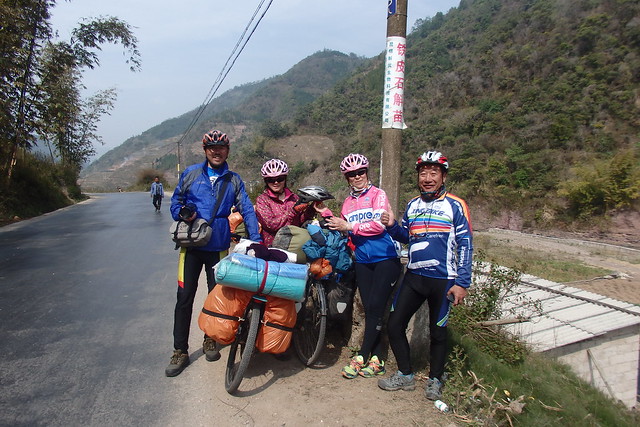
I camped by the river at the edge of a small village. There was a road leading into the river that didn’t seem like it could possibly be in use so I went to sleep confident I wouldn’t be disturbed. I woke at the crack of dawn to the sound of a motorbike revving outside my tent. I got out to see what was going on and saw a motorbike driving straight into the river, wobbling about in the water and then rolling up onto the far shore. As I packed up my tent I waved hello and watched the local women wade through the water to the sugar cane field on the other side loading up the motorbike for a wet return trip.
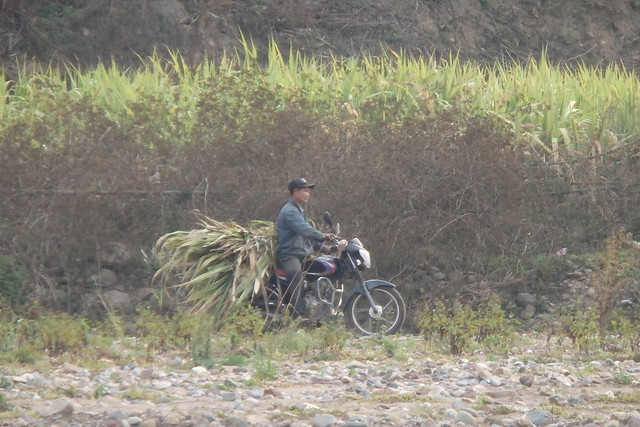
One of the women cut her foot walking through the river. She beckoned me over to help and pointed to some weeds she wanted me to pull out and give to her for the wound. I jumped at the chance to play ‘knight in shining armor’, put down my porridge and ran back to get my first aid kit. (When I say ‘first aid’ I mean my medical bag consisting of paracetamol, a couple of plasters and nothing else). She politely declined the plaster I offered and continued ripping up the weeds and rubbing them into the blood. Probably much more healthy than sticking my bits of plastic over the cut…
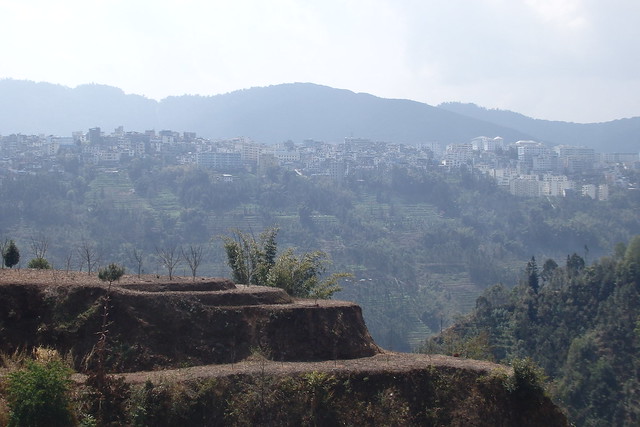
I passed the town Lincang as I continued east. Another huge dam operation was underway. I’ve passed many new dams being built in China but this one was the craziest. A huge section of the valley had been blocked off, leaving a strange plateau of moon-like ‘nothingness’. The town itself was crammed onto a mountain ridge, while terraced fields lead down into a pancake flat wall blocking the river that used to flow through. It was a surreal sight.
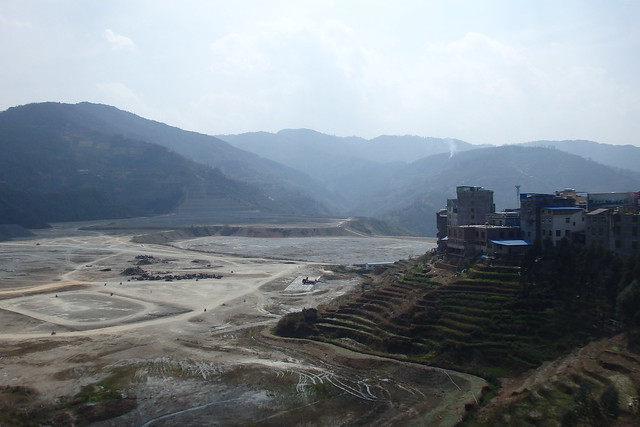

The Chinese seem to obsessed about fucking with Mother Nature. I can’t think of a politer way to put it. The motorways being blasted through the mountains are one thing, but this constant messing of waterflow is another. I’m sure the Chinese judging these developments are more qualified to estimate the long-term effects than me, but I can’t help but think that it must be impossible to accurately predict the effects on the surrounding ecological balance. There have been plenty of critics from China’s neighboring countries and further afield on the changes to landscape and ecological habitat for many miles along the affected rivers.

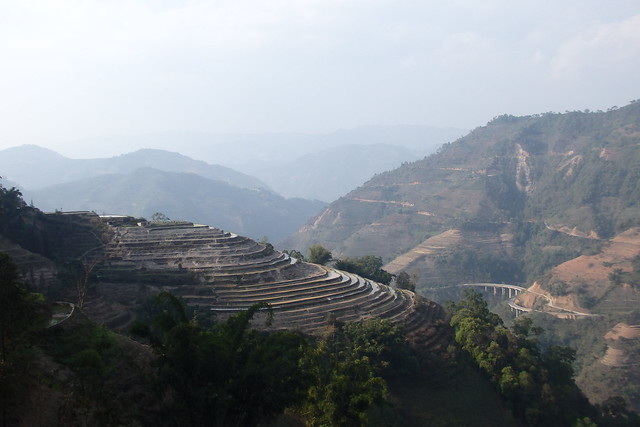
I continued towards Yuanyang. Incredibly, I’d not been anywhere mentioned at all in the Chinese guidebooks (I have Lonely Planet and Rough Guide’s books on my Kindle) for almost a month but finally I was reaching somewhere of touristic interest. The Hani’s vast rice terraces make Yuanyang a famous site but even the roads leading up into the mountains were phenomenal riding.
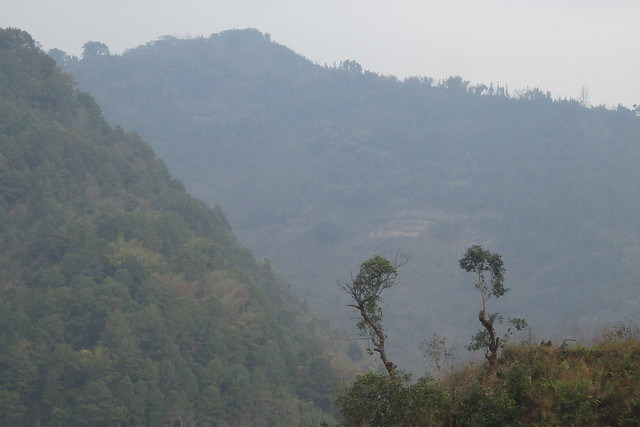
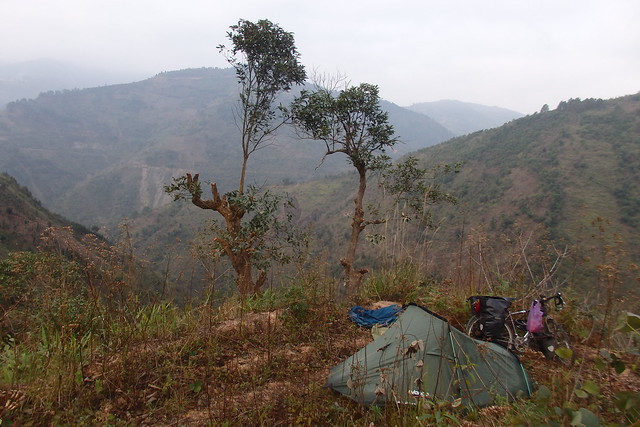
I met some drunk guys riding up a tiny road. They invited me back to their village for ‘food, sleep and drink’ but they were too pissed. I don’t even like hanging out with my own mates when they’re that drunk and I’m sober, let alone a bunch of strangers I share no common language with. They wobbled off on their motorbike upset that I’d declined their invitation. Even if they’d been sober I probably would have gone my own way: I was still little nervous about making it out the country in time.
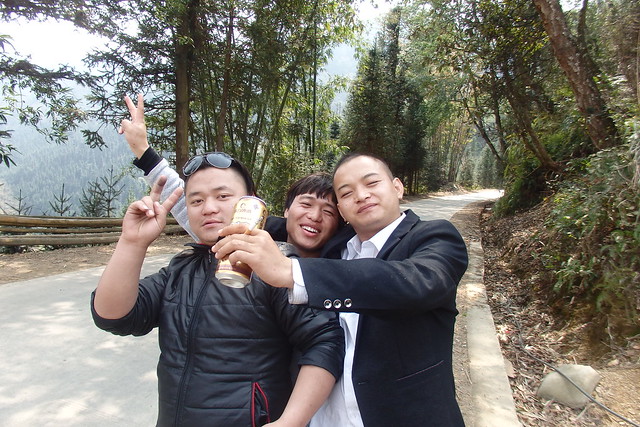
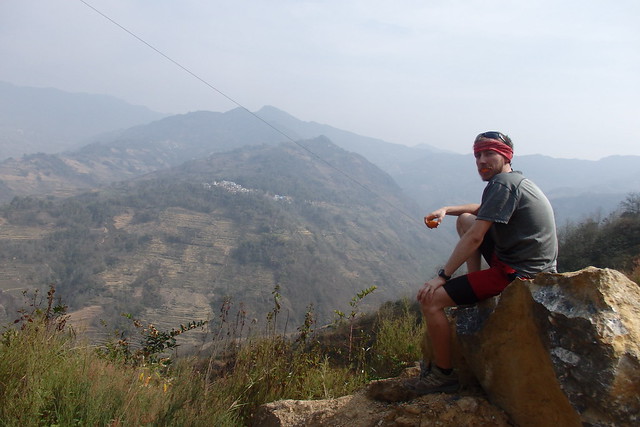
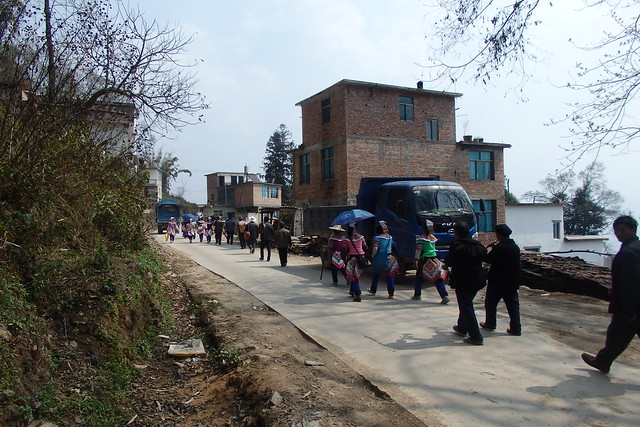
There was a wedding procession further up the mountain. A brigade of women in colourful dresses marched by, followed by men banging drums and blasting trumpets in a very un-musical assault. I took a quick photo as they walked passed. I wish I was better at just sticking my camera in strangers’ faces and just snapping away like the Chinese tourists. (Almost all the people featured in this blog asked to take my photo before I took there’s, and with the others I at least established some kind of a relationship with before getting my camera out).
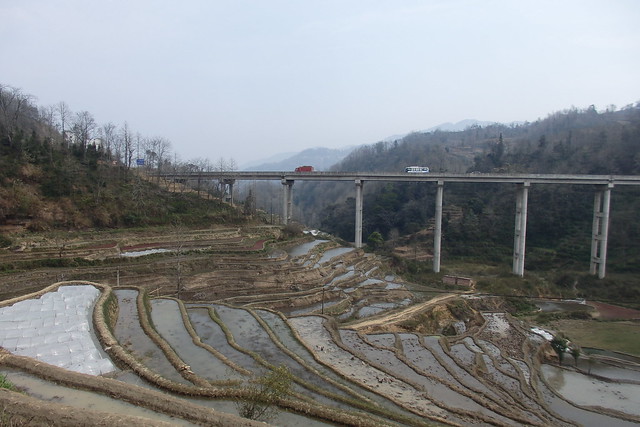
As I arrived closer to the scenic ‘tourist area’ I spotted some Chinese tourists following a local guy walking his buffalo through the village desperately trying to get the best action shot of him walking home. Then they spotted me on the way up the hill and all ditched the buffalo man in unison to switch the paparazzi session towards me. I found it amusing that I was the more exciting specimen.

I stayed in a hostel in Pugao Laozhai village. Finally there were westerners around. I hadn’t slept in the same bed twice since Shangri-La and I was excited about having a day off to be a normal tourist.
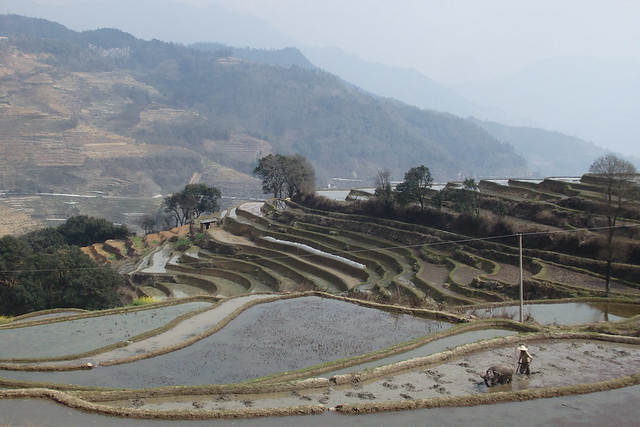
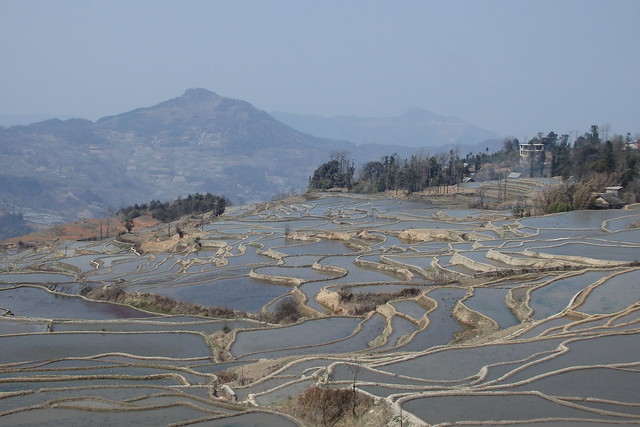
The rice terraces around the mountains were stunning. As with all the tourist attractions in China the entry fee was extortionate, but I cycled up from the ‘wrong’ side of the mountains and entered without paying.
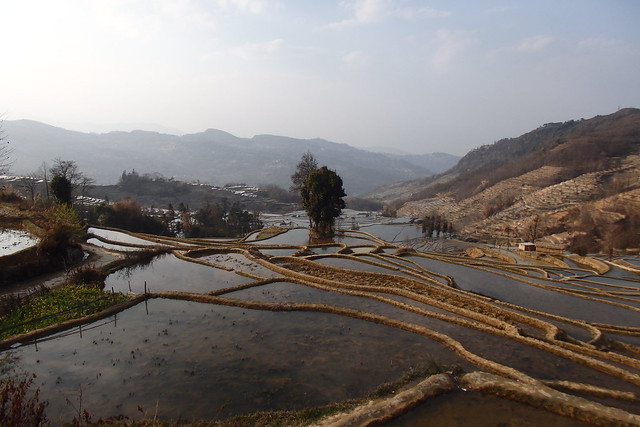
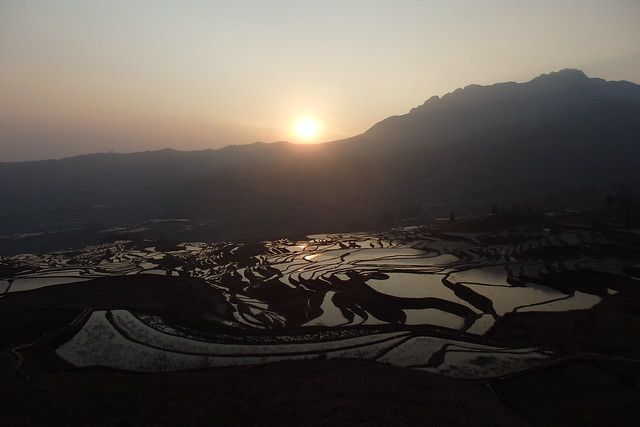
It was beautiful. China had really saved some of its best until last. I’ll let the pictures do the talking on this one…

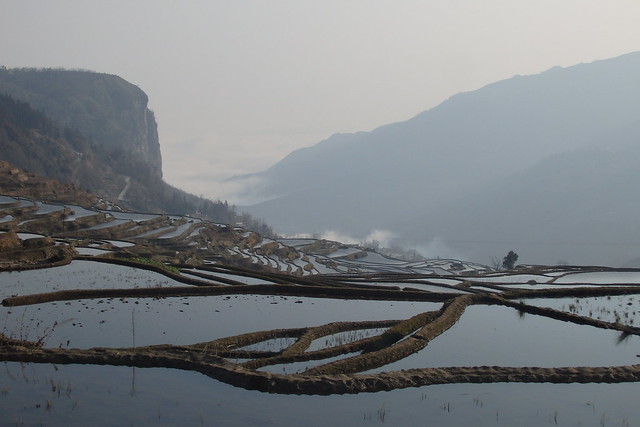
Without a ticket I couldn’t get onto the viewing platforms but that was fine by me – they were packed with every amateur photographer in the country and you could walk down to to equally scenic free viewpoints if you were up for a little scramble through the paddies. For sunset I sneaked onto one of the platforms and the camera scrum was insane.

From Yuanyang I just had a last little push to the border. As I pedaled out of town I nipped into a shop to get some water. The owners invited me to have lunch with them. The exact same had happened the day before in another village. The baiju was out, of course, but I was sensible this time and only had a couple glasses. Even in such a touristy area, people were still selfless and generous. I got the impression that the Hani locals preferred foreign visitors than the domestic Han tourists.
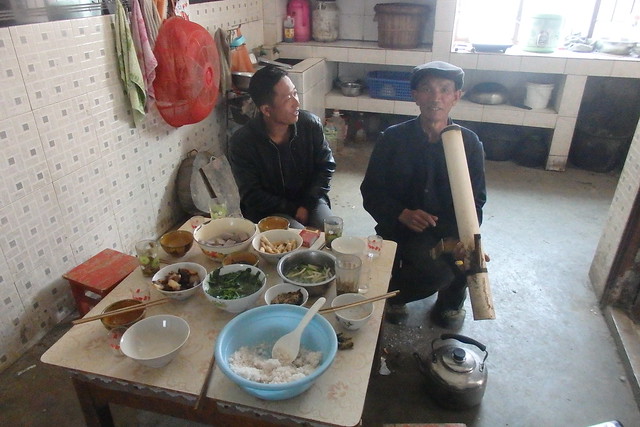
The mountains were done, for now at least. I nipped down from 2,000m to below 500m and followed the river south-east for a couple of days.
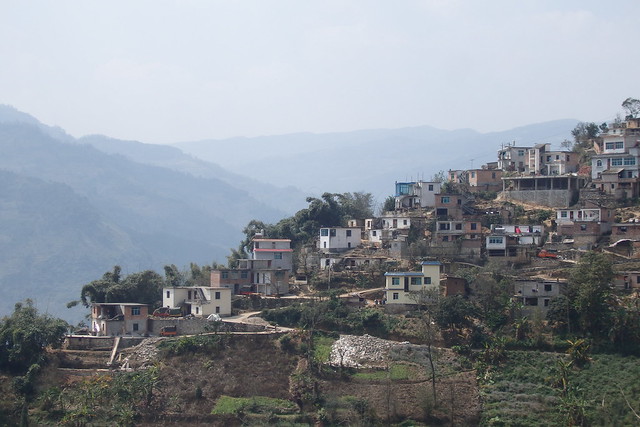
Finally I was able to cycle over 100km a day – something I’d not been able to achieve since I left the Gobi desert. China has offered some relentless mountain cycling. It’s been 3 months of continuous up and downs and I was happy to cycling along something vaguely flat (although I still ascended over 1,000m a day).
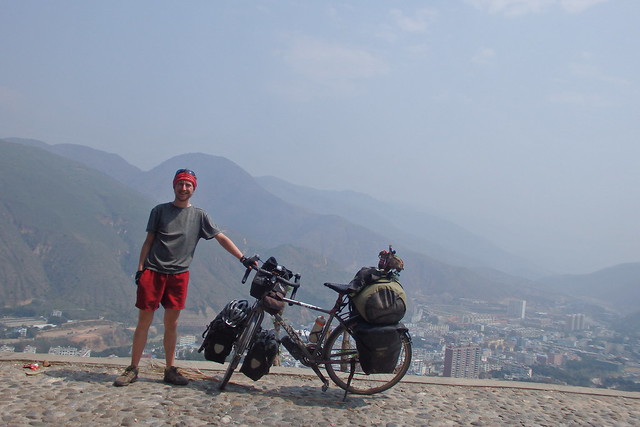
As I packed up my tent the last morning I couldn’t wait to leave the country. I’ve imagined how this moment might feel many times over the last 4 months. Most of the time I knew I’d be thinking how I couldn’t wait to leave, simply because it was an exhausting country to travel so much of the time. But now I couldn’t wait to leave simply because the time felt right. I’d seen so much in China and learnt so much – I had enough to reflect on for a long time.
There were some real low points in China. I’m really glad the last section was so special. Had I left the country after my first month I would have looked back hating it. Now I can honestly say I loved my time in China.
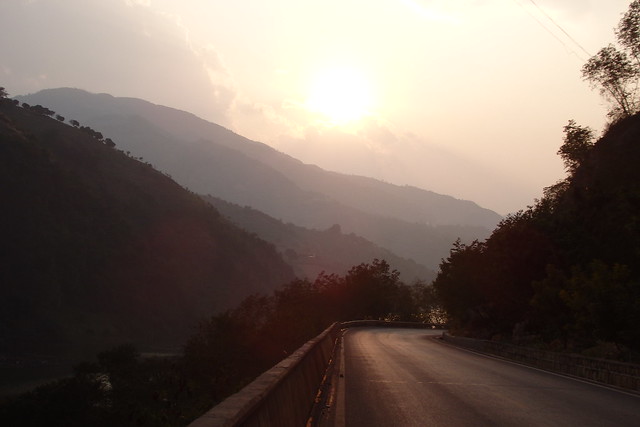
China was constant love/hate relationship, but that makes perfect sense. That country is just a world of opposites: culturally, geographically and socially.
I can divide it into three clear sections: the first was my ride across the vast deserts of the north-west, the second was the time I spent up on the Tibetan Plateau and the third was the ride through the ethnic clutter of Yunnan’s tropical valleys. I don’t feel like I cycled in just one country – China was like cycling through so many countries in a few months.
In fact, I was never really in ‘proper’ Han China. I didn’t see the urban mega-city side of the country that gets shown on BBC. Instead I invested my time with the Chinese ethnic groups that have done their own thing for centuries outside a unified empire and indeed, many of them still feel like that, despite the Han Chinese’s aggressive cultural saturation.
In the north-west I was around the Uighur Muslims, then I climbed into the mountains to hang out with the Tibetans and then down south I was zig-zagging through a staggering mixture of other ethnics groups’ territory. Naxi, Dulong, Lisu, Bai, Wa and Hani are just a few of the peoples I met over the last month.
It was in China that I finally left the Muslim world behind. The mosques began to become infrequent after I left the minaret lined Linxia (China’s ‘Little Mecca’) and slowly started to mix with temples – my first taste of the Buddhist world in the Tibetan strong-holds. I saw the first Christian churches in a long time but also began to get confused by other splashes of Taoism and Confucianism thrown into the mix.
The geographical differences were startling. From the endless Gobi desert, to sleeping in -20C on a snowy Tibetan Plateau, to being back in my t-shirt for the first time in 4 months once I was in the jungles of Yunnan and dripping in humid sweat as I reached the Vietnamese border. I also passed the lowest and highest points of my tour in China. About 50m below sea-level in the desert near Turpan to the highest mountain pass of my tour – 4,708m on my escape from the Tibetan Plateau.
China delivered some of the toughest physical cycling of my tour so far, but it also presented the hardest mental challenges. For the first time since I left England I really began to suffer from loneliness. There were a bunch of factors why I struggled over the first month. The desert was the most remote place I’d cycled (up to 400km between towns) and the cold was starting to make things very difficult. The hotel situation was infuriating (most of the hotels in Xinjiang province would refuse to accept foreigners thanks to ‘sensitive’ ethnic tension in the region) and the language barrier was exhausting. Weeks would pass without me speaking a proper conversation. That had never happened before on this tour.
The Chinese attitude didn’t help either. I hate to make such a sweeping generlisation but a whole bunch of the different ethnic groups were guilty of the same miserable welcome.
Leaving China feels a little like breaking up with a girlfriend I’ve been with for 4 months. We’ve shared some wonderful moments together, but the fall outs have been exhausting. Sorry China – it’s not me. It’s you. You’re like this awkward friend we all have who acts cool when they want to, but when you take them to a party where they have to meet new people they act all weird. China has a social problem. It’s no wonder they have such a bad reputation as tourists abroad and nor is it surprising that most Western visitors to the Middle Kingdom leave with at least a few things to complain about.
Why were people in China unable to say hello or offer a welcome? Nothing makes you feel a more isolated foreigner (or Laowai) than blank stares from people who have no interest in greeting you. No other country has made me feel like that.
As I said in one of my earliest blogs – China is a land of opposites. The same applies to the people. Yes, I met a lot of miserable people. But I also met some extraordinary ones. People in China are incredibly generous. From the policeman in Hani who bought me my China map, the cyclists in Chengdu who took me out to dinner, the villagers in Yunnan who took me in for the night, the locals who offered me money when I said I was broke… the list goes on and on.
Like I wrote above about with the cigarette culture at the wedding and being invited to lunch during my last few days – so much of the hospitality in China seems to relolve around sharing. I really like that side of the Chinese culture.
‘Culture’ in China has a zillion sides. Every people have their own history and as a nation they have a complex and intriguing multi-faceted history book. Even if the national character was baffling at times when people performed outrageous mental gymnastics to avoid loosing face, it was still great fun to try and understand the Chinese mindset.
I should mention that many of my observations would be hugely different had I spent time in the east of China. I was in small, rural areas most of the time which would make a big difference in any country. This un-shakeable faith in the government would be a good example of that. As I wrote in the previous blog, the willingness for people to tell me how great the government was made me feel uncomfortable at times. On paper things look great, especially when you cycle past so many monster new motorways being blasted through the mountains but whether or not China will be able to continuing pumping back into it’s own physical economy is another question. I’m no economist, so I won’t go there.
The government is great in many ways, I’m sure. It’s terrible in many others and I can write about them freely now I’m out of the country. Many of the younger Chinese would point out how China isn’t involved in any foreign wars. What about the internal ones? The paranoid military presence in Xinjiang was surreal and the closed off central Tibet is ridiculous. China’s aggressive cultural oppression is unsettling on a range of levels. It’s a country where free-speech is near non-existant under heavy media-regulation and constant police presence. (I was in Hong Kong when those booksellers ‘mysteriously’ disappeared). Their tactics to impose Han culture across the nation is done without delicacy and saturation of peoples with great personal history is a gross violation of leadership.
China is clearly an important player in the world these days and its people know it. I learnt how to say ‘what is your country’ in Mandarin very quickly in China, but I forgot it equally quick as no-one ever seemed to ask me. In Central Asia I was bombarded with that question every day. At times it felt like China has this real ‘us and them’ mentality. Perhaps it’s different here because China is one of the most ‘important’ countries in the world. As far as they’re concerned they have the richest culture, a great and growing amount of influence and any of their problems in the past were caused by the western powers.
When I look back at China, the most frequently recurring memory is thinking ‘how can a place be so beautiful?’. I’ve cycled some stunning mountain ranges across the Balkans, Caucuses and Central Asia but none have been so deep and varied as in China. Once I left the Hexi Corridor and headed up towards Tibet the ‘hairs up at the back of the neck’ moments were near daily. Camping among sharp mountains on a sandy beach by the Mekong river, riding snow-covered sections above 4,000m that looked like they could have been in Antarctica and descending rows and rows of switchbacks along monstrous rock faced mountains.
For me, China will be remembered as an incredibly beautiful part of the world and a wonderful place for an adventure on two wheels…
We really enjoyed reading this, thanks Jonathan! So far we have had a great time here, even if the non-highway roads are damn awful, although I think it’s going to get more challenging once we get beyond the touristic yunnan… I’m not looking forward to getting rejected by hotels as, although we mostly enjoy camping, right now they are very appreciated!
LikeLiked by 1 person
Good to hear it was of interest!
Glad China’s treating you guys well… Enjoy the odd hotel while they’re cheap and easy to find!!
LikeLike